
Central European Journal of Economic Modelling and Econometrics
Scope & Guideline
Fostering global discourse in economic modeling and econometrics.
Introduction
Aims and Scopes
- Economic Modeling:
The journal emphasizes the development and application of economic models that capture the complexities of real-world economic systems, including general equilibrium models, business cycle models, and macroeconomic frameworks. - Econometric Analysis:
A core focus is on econometric techniques and methodologies that analyze economic data, allowing researchers to draw meaningful conclusions about economic behavior and relationships. - Regional Economic Studies:
The journal often publishes studies that analyze economic phenomena at regional levels, particularly within Central and Eastern Europe, providing insights into local business cycles, economic growth, and policy implications. - Public Policy and Economic Impact:
Research that assesses the impact of public policies on economic outcomes is a significant area, with papers exploring topics like taxation, public healthcare, and governance related to economic performance. - Innovative Statistical Methods:
The journal encourages the use of advanced statistical methods, including Bayesian approaches, neural networks, and regression techniques, to enhance the rigor of economic research.
Trending and Emerging
- Sustainability and Economic Resilience:
Recent studies are increasingly focusing on the interplay between economic policies and sustainability, particularly in relation to achieving the Sustainable Development Goals (SDGs) and ensuring economic resilience. - Impact of Technology on Economics:
There is a rising interest in how technological advancements, including artificial intelligence and data analytics, influence economic models and decision-making processes. - Cross-Country Comparative Analysis:
Research that compares economic phenomena across different countries, particularly in the context of Central and Eastern Europe, is gaining traction, allowing for broader insights and policy implications. - Health Economics:
The field of health economics is emerging strongly, with studies exploring the economic implications of health-related issues, public healthcare efficiency, and the indirect costs of illness. - Behavioral Economics and Decision-Making:
There is an increasing emphasis on behavioral economics, examining how psychological factors influence economic decisions, which is reflected in recent publications addressing public willingness to pay and consumer behavior.
Declining or Waning
- Traditional Economic Indicators:
Research focused on classical economic indicators and their traditional interpretations seems to be waning, as the field moves towards more nuanced and complex analyses of economic behavior. - Static Economic Models:
The reliance on static economic models appears to be decreasing, with a growing preference for dynamic models that better capture the evolving nature of economies. - Basic Descriptive Statistics:
There is a noticeable decline in publications that solely rely on basic descriptive statistics without advanced econometric analysis, indicating a shift towards more sophisticated analytical frameworks. - Fixed-Parameter Approaches:
The use of fixed-parameter econometric models is less common in recent publications, as researchers increasingly adopt flexible modeling techniques that allow for structural changes and parameter variations.
Similar Journals
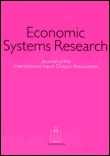
Economic Systems Research
Unraveling Complexities, Shaping FuturesEconomic Systems Research, an esteemed journal published by Routledge Journals, Taylor & Francis Ltd, is a pivotal platform within the field of economics and econometrics, focusing on the complexities of economic systems and their interactions. Established in 1989, it has maintained a robust publication cadence, converging towards 2024, and has earned a notable standing with a 2023 Scopus ranking placing it in the 79th percentile among its peers, categorized as Q2 in the competitive landscape of Economics and Econometrics. This distinction underscores its impact and relevance in disseminating quality research. With a commitment to advancing the understanding of economic dynamics, the journal serves as a vital resource for researchers, professionals, and students seeking to explore innovative frameworks and empirical analyses within economic systems. Although it offers traditional subscription access, the journal's wealth of knowledge is crucial for those keen on contributing to and staying abreast of the latest developments in the discipline.
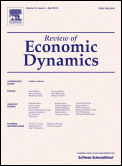
REVIEW OF ECONOMIC DYNAMICS
Shaping Economic Theory through Empirical ResearchREVIEW OF ECONOMIC DYNAMICS, published by Academic Press Inc, Elsevier Science, is a leading academic journal in the field of economics and econometrics, holding a distinguished Q1 ranking in its category as of 2023. With an impactful focus on the theoretical and empirical analysis of dynamic economic systems, the journal seeks to advance our understanding of economic dynamics through innovative research that addresses contemporary issues and policy implications. The journal boasts a significant history of contributions from renowned scholars since its inception in 1998, and will continue to publish through 2025. Although it does not currently offer open access options, the journal serves as a crucial resource for researchers, professionals, and students who are keen to explore and engage with the latest findings in economic theory and practice. With a current Scopus rank of #280 out of 716 in the Economics and Econometrics category, the REVIEW OF ECONOMIC DYNAMICS remains an invaluable platform for scholarly discussion and insight into the complexities of economic behavior.
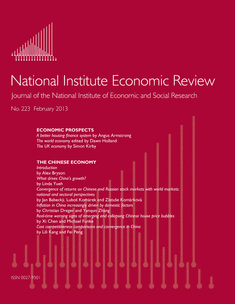
National Institute Economic Review
Illuminating pressing economic issues with scholarly precision.National Institute Economic Review, published by CAMBRIDGE UNIVERSITY PRESS, stands as a pivotal academic journal within the realms of Economics, Econometrics, and Finance. Since its inception in 1960, this journal has continually provided insightful research and analyses that address pressing economic issues, making significant contributions to both theoretical and applied economics. With a notable Q1 category ranking in the 2023 Scimago Journal Rank, it is recognized as a leading publication in its field, currently ranked #62 out of 288 in Scopus. The journal aspires to foster a deeper understanding of complex economic phenomena, offering a platform for both established and emerging scholars. While it operates under a traditional access model, the integrity and rigor of the content ensure its relevance and utility for researchers, professionals, and students alike. The interdisciplinary approach taken in the articles published not only enhances the comprehension of economic policies but also encourages dialogue among diverse economic theorists and practitioners worldwide.

Economics-The Open Access Open-Assessment E-Journal
Exploring the Frontiers of Economic ThoughtEconomics - The Open Access Open-Assessment E-Journal, published by DE GRUYTER POLAND SP Z O O, is a prominent scholarly platform in the field of economics, designed to foster the widespread dissemination of research since its inception as an open-access journal in 2007. With a focus on innovative and interdisciplinary studies, this journal accommodates a diverse range of topics within economics, econometrics, and finance, providing valuable insights that are vital for researchers, professionals, and students alike. Situated in Germany and boasting an increasing recognition within the academic community, the journal currently holds a Q3 classification in the Economics, Econometrics, and Finance category, reflecting its solid contribution to the field as per Scopus rankings. This journal invites submissions that prioritize accessibility and comprehensive peer assessment, promoting high-quality research that influences both academic and practical realms. As an essential resource for staying abreast of contemporary economic discourse, Economics continues to advocate for knowledge-sharing and accessibility in an evolving global landscape.

Economic Computation and Economic Cybernetics Studies and Research
Empowering Economic Insights through Computational Excellence.Economic Computation and Economic Cybernetics Studies and Research, published by EDITURA ASE in Romania, serves as a vital platform for the dissemination of innovative research in the fields of applied mathematics, economics, and computer science applications. Established in 1968, this journal spans several decades of academic scholarship, converging expertise and insights that are instrumental in shaping current economic theories and methodologies. With an HIndex reflecting the impact of its contributions, the journal has garnered a Q4 ranking in Applied Mathematics and Computer Science Applications, alongside a Q3 distinction in Economics and Econometrics as of 2023. Its commitment to fostering an open exchange of ideas is crucial for researchers, professionals, and students who are navigating the complexities of economic cybernetics and computational economics. Although it operates without open-access options, its robust accessibility ensures that the research published within reaches a broad audience, further enhancing its relevance and importance in today’s rapidly evolving economic landscape.
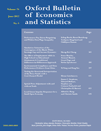
OXFORD BULLETIN OF ECONOMICS AND STATISTICS
Unveiling critical trends in the global economic landscape.The Oxford Bulletin of Economics and Statistics, published by Wiley, stands as a leading journal in the realms of Economics, Econometrics, and Statistics. Since its inception in 1973 and converging through to 2024, the journal has consistently positioned itself in the top quartile (Q1) across multiple categories, including Economics and Econometrics, Social Sciences, and Statistics and Probability, highlighting its influential status in the academic community. With a commendable ranking within Scopus, notably ranked #53 in Social Sciences and #28 in Statistics and Probability, it serves as a critical platform for disseminating rigorous research and innovative methodologies. Researchers, professionals, and students are encouraged to contribute and engage with the high-quality content that defines this esteemed journal, which does not currently offer Open Access but remains a pivotal resource for those seeking to deepen their understanding of economic and statistical paradigms in the pressing global landscape.

Econometrics and Statistics
Innovating the future of data analysis and decision-making.Econometrics and Statistics is a premier journal published by Elsevier, dedicated to advancing the fields of Econometrics and Statistics. Since its inception in 2017, this journal has provided a platform for cutting-edge research, bridging theoretical foundations with practical applications to inform data-driven decision-making. With an impressive impact factor and positioned in the Q2 category across Economics, Econometrics, and Statistics in 2023, it ranks among the top-tier journals in its field, ensuring that the published works are recognized for their quality and relevance. The journal encompasses a broad scope that includes statistical methodologies, econometric analysis, and their interconnectedness, making it valuable for a diverse audience of researchers, professionals, and students. Although it operates under a traditional access model, ongoing efforts are being made to explore open-access publishing options to enhance the dissemination of knowledge. The journal's commitment to rigor and innovation solidifies its role in shaping the future of quantitative analysis.
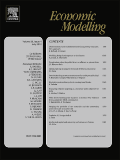
ECONOMIC MODELLING
Unlocking the Future of Economics with Innovative Methodologies.ECONOMIC MODELLING, published by Elsevier, is a leading academic journal in the field of Economics and Econometrics, with a commendable impact factor that underscores its significance within the research community. Since its inception in 1984, this journal has been pivotal in disseminating high-quality research that contributes to the advancement of theoretical and empirical methodologies in economics. As a Q1 journal in its category, it ranks in the top 88th percentile according to Scopus, solidifying its reputation as an influential platform for economists and academicians. Although it does not offer open access, the journal maintains a robust subscription model, ensuring wide distribution of critical insights and findings. Researchers, practitioners, and students are encouraged to engage with the latest developments in economic modelling, making ECONOMIC MODELLING an essential resource for anyone seeking to understand and contribute to the evolving landscape of economic theory and application.
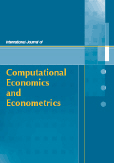
International Journal of Computational Economics and Econometrics
Pioneering the future of economics with cutting-edge computational methodologies.International Journal of Computational Economics and Econometrics is a peer-reviewed academic journal published by INDERSCIENCE ENTERPRISES LTD, focusing on the intersection of computational methodologies and economic analysis. With an ISSN of 1757-1170 and an E-ISSN of 1757-1189, this journal provides a crucial platform for researchers and professionals interested in innovative computational approaches to tackle real-world economic problems. While it currently does not operate under an open-access model, the journal is committed to advancing knowledge in its field, particularly as it occupies a vital niche within Computer Science Applications and Economics and Econometrics, ranking in the Q4 quartile for both categories as of 2023. Covering the period from 2017 to 2024, the journal aims to foster interdisciplinary collaboration and encourage the integration of advanced computational techniques into traditional economic theory and practice. As it continues to evolve, the International Journal of Computational Economics and Econometrics remains essential for academics and practitioners looking to stay at the forefront of technological innovations in economics.

JOURNAL OF QUANTITATIVE ECONOMICS
Advancing Economic Insight Through Quantitative AnalysisJOURNAL OF QUANTITATIVE ECONOMICS, published by SPRINGER, is an influential academic journal focusing on significant quantitative methodologies in the field of economics. With its ISSN 0971-1554 and E-ISSN 2364-1045, the journal aims to deliver high-quality research that explores theoretical and empirical applications in economics and related disciplines. Operating from Switzerland, this journal has gained recognition for its contributions, achieving a position in the Q3 quartile for Business and International Management, Development, and other related categories in 2023. While it does not currently offer open access, it is accessible through various libraries and institutions for scholars interested in advancing their understanding of quantitative economic analysis. By fostering a dynamic dialogue among researchers and practitioners, the JOURNAL OF QUANTITATIVE ECONOMICS plays a crucial role in shaping insights and driving innovation within the economic landscape today.